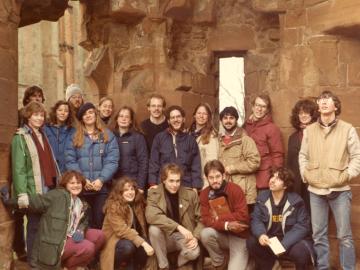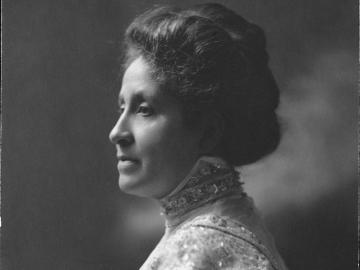Oberlin Alumni Magazine
Secret Sauce
June 13, 2024
Hanna Raskin ’98

Nearly every Oberlin Student Cooperative Association (OSCA) member in the 1970s had to give serious thought to the organization’s relationship with the college and the environmental consequences of eating meat.
But on top of participating in those animating debates, OSCA board members also had to determine who could join a co-op in the first place.
“It was really high pressure,” said Maggie Bayless ’77, who in her senior year served as OSCA’s membership secretary.
Even though slots were distributed through a lottery, Bayless’ classmates begged for special consideration: One even tried to sway her with a quarter taped to Congressional letterhead, swiped from the office where he was interning. But during Bayless’ tenure, OSCA came up with a workaround. Instead of drawing names from a hat, the board programmed a punch card machine in Mudd Library to randomize applications and spit out a list.
Although Bayless didn’t know it at the time, the process improvement foreshadowed her future career. In 1994, after a dozen years of collaborating with the collection of businesses that grew out of Zingerman’s Deli in Ann Arbor, Michigan, Bayless founded ZingTrain. A kind of ongoing colloquium for progressive business owners, ZingTrain helps its seminar takers find tools and master methodologies to strengthen their organizations.
In short, ZingTrain teaches well-meaning food entrepreneurs (and everyone else who signs up for its courses) how to overcome system glitches that threaten to undermine their passion or derail their vision.
Bayless said she often encounters people who are surprised that Zingerman’s is willing to share its approach to leadership development, staff training, and self-management, among other topics. But in keeping with her cooperative background, Bayless can’t imagine monopolizing valuable information.
“I’m not interested in policing what other people are doing,” she said. “That’s such a downer. If it improves the overall level of customer service, that’s great—and we learn more ourselves by teaching. It’s just that abundance mentality.”
While Bayless credits Zingerman’s founders Ari Weinzweig and Paul Saginaw with fostering that mindset, Weinzweig in turn credits Bayless with working “quietly, consistently, collaboratively [and] caringly.” When Bayless stepped back from day-to-day ZingTrain responsibilities in 2020, Weinzweig wrote, “Some people say they’re ‘in it to win it.’ I think Maggie’s always been in it to help others around her come out ahead.”
The daughter of two Oberlin graduates, Bayless grew up visiting campus: The school was such a steady presence in her life that she didn’t apply anywhere else. At Oberlin, she studied German literature. Soon after graduation, she got a job at First National Bank of Chicago. But her college boyfriend had moved to Ann Arbor, “which seemed like this cool, groovy town,” so she relocated to join him.
Almost immediately, their romantic relationship ended. But Bayless’ relationship with Ann Arbor was just beginning. She’d met Weinzweig when the two were waiting tables at the same restaurant, and she became an informal advisor to the deli when it opened in 1982. Bayless worked Saturday counter shifts while she earned her MBA from the University of Michigan and stayed close to the operation as instructional design emerged as her dominant professional interest.
“When the world news is really depressing, I teach a seminar and realize there are all of these people doing great work,” she said. “It isn’t making headlines, but it makes life worth living.”
Spoken like a true OSCA membership secretary.
Risotto alla Sbirraglia
“Risotto is my go-to,” says Maggie Bayless, who’s partial to short ingredient lists. But she insists on using the best rice, cheese, and olive oil for this favorite recipe, adapted from Norma Wasserman and Judith Barrett’s 1989 collection of risotto preparations. According to the authors’ headnote, this chicken risotto tracks back to Harry’s Bar in Venice.
Ingredients
4 tablespoons unsalted butter, divided
½ pound boneless, skinless chicken breast, diced
¼ cup green pepper, finely chopped
¼ cup red pepper, finely chopped
Salt and pepper
5 cups chicken broth
1 tablespoon olive oil
⅓ cup onion, finely minced
1 and ½ cups Arborio rice
½ cup dry white wine or chicken broth
1 tablespoon fresh parsley, chopped
⅓ cup Parmesan cheese, grated
Instructions
Heat 2 tablespoons of butter in a skillet over medium heat.
When it starts to foam, add chicken and bell peppers.
Sauté until chicken is cooked through, about 5-10 minutes.
Salt and pepper to taste. Remove from heat.
Simmer 5 cups of chicken broth in a saucepan.
While broth is heating, add remaining butter and olive oil to a heavy 4-quart casserole over medium heat.
Add onion and sauté for 1-2 minutes, just until onion is softened.
Pour rice into mixture and stir with a wooden spoon.
Once all grains are coated, add the wine, and continue to stir until the liquid is absorbed.
Add simmering broth to the rice, ½ cup at a time, stirring frequently.
Wait until the broth is fully absorbed before adding another half-cupful.
Reserve ¼ cup of broth.
After roughly 18 minutes, when rice is tender but firm, add reserved broth, chicken-and-pepper mixture, parsley, and cheese.
Stir vigorously until fully combined and serve immediately.
This recipe originally appeared in the Winter/Spring 2024 issue of the Oberlin Alumni Magazine in the story “Secret Sauce”.
https://www.oberlin.edu/news/secret-sauce
This story originally appeared in the Winter/Spring 2024 issue of the Oberlin Alumni Magazine.
Tags:
You may also like…
Voices Carry
March 13, 2025
Grammy-certified vocalist and viola da gamba player Ari Mason ’14 finds her niche in video games, films, and a vocal library.
London Calling
March 13, 2025
For Tracy Chevalier ’84, the Oberlin-In-London program was a magical, intense period of cultural and intellectual stimulation. As the beloved study-away experience celebrates 50 years, the New York Times best-selling author looks back on the semester she spent studying and living in London.
A Banner Held High
February 26, 2025
In 2018, Oberlin College named its main library after civil rights leader Mary Church Terrell, Class of 1884.


